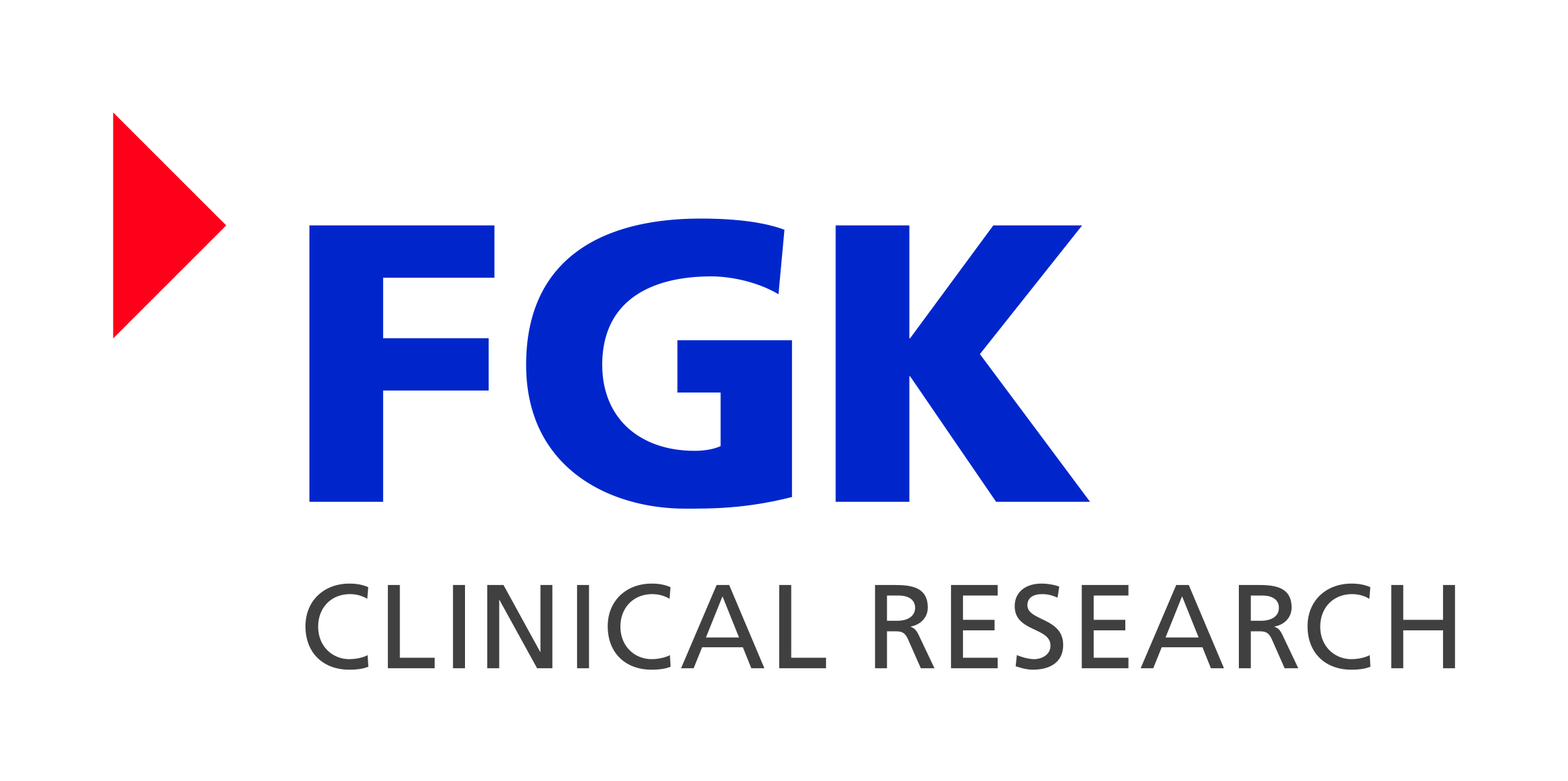Latest News from ACDM
Established in 1987, The Association for Clinical Data Management (ACDM) is a Membership Organisation for individuals and organisations involved in the management of clinical data. Please find below the latest news from the ACDM.
April 23, 2024 | New Member
Welcome FGK Clinical Research as a new corporate member
The ACDM: Association for Clinical Data Management is delighted to welcome FGK Clinical Research as a new corporate member.

FGK provides full service for clinical studies to biotechnology, medical device and pharmaceutical companies. They have the right size to handle international multi-center studies with hundreds of patients or single country studies with a few patients, but is still small enough to guarantee a personal service to the sponsor.
FGK Clinical Research joined the ACDM to exchange ideas with the data management community and to learn from each other.
Members gain many benefits from membership, including:
- Access to training courses at a discounted rate
- Assign full ACDM membership to all individuals within your organisation
- Place an organisation profile, description and logo on the ACDM website
- Advertise jobs for your positions within your organisation
- Reduced price attendance at conferences and symposia
- Free attendance at Hot Topics
Find out more about becoming a corporate member here.
April 5, 2024 | New Member
Welcome LINK Medical as a new corporate member
The ACDM: Association for Clinical Data Management is delighted to welcome LINK Medical as a new corporate member.

LINK Medical is a leading Contract Research Organization and Regulatory service provider offering experts, flexible services, and innovative technologies across Northern Europe and beyond. Additionally, their transparent Nordic culture provides a high-quality service delivery based on respect, work integrity and a strong focus on solutions.
LINK Medical joined the ACDM to exchange knowledge with other members within the Data Management field.
Members gain many benefits from membership, including:
- Access to training courses at a discounted rate
- Assign full ACDM membership to all individuals within your organisation
- Place an organisation profile, description and logo on the ACDM website
- Advertise jobs for your positions within your organisation
- Reduced price attendance at conferences and symposia
- Free attendance at Hot Topics
Find out more about becoming a corporate member here.
March 26, 2024 | New Member
Welcome Zilla Clinicals as a new corporate member
The ACDM: Association for Clinical Data Management is delighted to welcome Zilla Clinicals as a new corporate member.

Zilla Clinicals LLC is a data-focused contract research organization (CRO). They serve clients worldwide in optimizing the collection, validation, standardization, archiving, and reporting of clinical research data. They also adopt an FSP model to assist Pharma and larger CRO companies in improving and innovating data processes, ensuring project timelines and deliverables are met. Their diverse & multidisciplinary team provides in-depth expertise and delivers high-quality solutions, including data management, database programming, and medical coding.
Members gain many benefits from membership, including:
- Access to training courses at a discounted rate
- Assign full ACDM membership to all individuals within your organisation
- Place an organisation profile, description and logo on the ACDM website
- Advertise jobs for your positions within your organisation
- Reduced price attendance at conferences and symposia
- Free attendance at Hot Topics
Find out more about becoming a corporate member here.
March 22, 2024 | News
Challenge ChatGPT: CDMs vs AI
Following a recent Hot Topic discussion that explained how machine learning models are trained using large datasets and need a human in the feedback loop to catch any errors and make the models more accurate, the ACDM Newsletter Committee have decided to put AI to the test.
The Committee have challenged ChatGPT v3.5, pitting the Artificial Intelligence brain against the Actual Intelligence of the committee members, to answer the question ‘How can data managers ensure the integrity of the data being collected in the clinical trial?’
How did the responses compare? Read the article here.
ACDM Newsletter Committee: Angela Paterson, Ali Roskell, James McKenna, Hanneke Lankheet-Buiel, Emily Voss, Elke Ydens
February 6, 2024 | New Member
Welcome Boehringer Ingelheim as a new corporate member
The ACDM: Association for Clinical Data Management is delighted to welcome Boehringer Ingelheim as a new corporate member.

Boehringer Ingelheim have been transforming lives in healthcare since 1885. They acknowledge the deep and complex ways the lives of humans and animals are interconnected, and work on breakthrough therapies and co-create solutions that help millions of people worldwide live longer, healthier lives.
Members gain many benefits from membership, including:
- Access to training courses at a discounted rate
- Assign full ACDM membership to all individuals within your organisation
- Place an organisation profile, description and logo on the ACDM website
- Advertise jobs for your positions within your organisation
- Reduced price attendance at conferences and symposia
- Free attendance at Hot Topics
Find out more about becoming a corporate member here.
January 12, 2024 | New Member
Welcome Datacapt as a new corporate member
The ACDM: Association for Clinical Data Management is delighted to welcome Datacapt as a new corporate member.

Datacapt provides an easy-to-use, flexible, and powerful electronic data capture platform (EDC) for on-site, hybrid, or decentralized Clinical Trials. They allow Sponsors, CROs, Sites, and Patients to work together. Their Platform brings simplicity, efficiency, and quality to the collection of clinical data.
Members gain many benefits from membership, including:
- Access to training courses at a discounted rate
- Assign full ACDM membership to all individuals within your organisation
- Place an organisation profile, description and logo on the ACDM website
- Advertise jobs for your positions within your organisation
- Reduced price attendance at conferences and symposia
- Free attendance at Hot Topics
Find out more about becoming a corporate member here.
More News
Welcome Climedo as a new corporate member December 15, 2023
EMA Management Board: Highlights of October 2023 meeting November 27, 2023
Clinical Trials for Medicines – New Notification Scheme November 27, 2023
Welcome Mednet as a new corporate member November 22, 2023
Welcome Allucent as a new corporate member November 14, 2023
Welcome KCR as a new corporate member October 20, 2023
Welcome Debiopharm as a new corporate member October 3, 2023
European Medicine’s Agency – Reflection paper on the use of artificial intelligence in the lifecycle of medicines September 25, 2023
ACT EU PA04 – Multi-stakeholder Workshop on ICH E6 R3 September 25, 2023
HMA/EMA joint Big Data Steering Group: Big Data Workplan 2023-2025 September 25, 2023
Welcome Instem as a new corporate member August 16, 2023
ICH GCP E6 Revision 3 is here. Regulatory Considerations Expert Group to review. June 19, 2023
Regulatory Considerations Expert Group reviews draft FDA Guidance June 19, 2023
Welcome Algorics as a new corporate member May 18, 2023
Guideline on computerised systems and electronic data in clinical trials April 25, 2023
FDA Guidance for Industry April 25, 2023
New MHRA Guidance April 25, 2023
Consultation response on legislative proposals for clinical trials April 25, 2023
Welcome IROS – Insights Research Organization & Solutions as a new corporate member February 9, 2023
Recommendation paper on decentralised elements in clinical trials December 19, 2022
Welcome George Clinical as a new corporate member December 16, 2022
Welcome Clinion as a new corporate member December 7, 2022
Welcome ClinoSol Research as a new corporate member October 18, 2022
CTU DMEG Update September 29, 2022
ICH E8 (R1) General Considerations for Clinical Studies Impact on Data Management April 5, 2022
Have your say – MHRA’s public consultation on proposals for legislative changes for clinical trials January 26, 2022
Signant Health are ACDM22 Photography sponsors November 19, 2021
Anju Software is exhibiting at ACDM22 October 29, 2021
SGS Health Science to sponsor ACDM Awards for the second year running October 1, 2021
ACDM Interactive September 7, 2021
nuvoteQ to be a Premier Sponsor of ACDM22 August 23, 2021
IQVIA to be a Premier Sponsor of ACDM22 August 19, 2021
Anju Software to be a Premier Sponsor of ACDM22 August 15, 2021
CORE to be Premier and Interactive Sponsor for ACDM22 August 12, 2021
eClinical Solutions to be Premier and Communications & Social Media Sponsor for ACDM22 August 5, 2021
ACDM Annual General Meeting July 29, 2021
Phastar announced as Premier & Conference Dinner Sponsor of ACDM22 July 1, 2021
New online training course – Risk Based Monitoring May 4, 2020
Building data management success in Sponsor/CRO relationships online webinar 30th April April 22, 2020
ACDM21 – Location announced April 8, 2020
ACDM Hot Topic Discussion – Implications of COVID-19 on clinical data management activities globally March 31, 2020
ACDM eDigital DMEG publishes its GDPR Q&A report March 30, 2020
ICON to be Premier & Award Sponsors for ACDM20 December 2, 2019
New Online Learning Course – Understanding Laboratory Data November 19, 2019
Nominations now open for ACDM Awards 2020 October 14, 2019
Phastar announced as Networking Sponsor for ACDM20 July 9, 2019
ACDM20 Dates & Venue July 1, 2019
Launch of Online Training from ACDM March 24, 2019
ACDM 2019 Awards Finalists February 22, 2019
Castor EDC to Sponsor ACDM19 January 15, 2019
Danone Nutricia Research to Sponsor ACDM19 November 26, 2018
ACDM19 Conference Programme November 21, 2018
Record Number of Abstracts Submitted for ACDM19 October 1, 2018
Phastar Sponsor ACDM19 September 3, 2018
Launch of Annual ACDM Awards September 1, 2018

